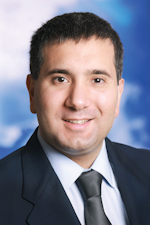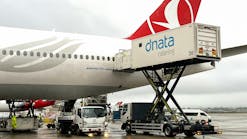The Factors Faced by Eastern Europe’s GHSPs
The aviation industry was impacted in an unprecedented way by the COVID-19 pandemic, which was entirely unexpected and has specifically affected aircraft ground handling.
Ground services in the eastern part of Europe have some defining features, including the fact that airports often own the ground handling companies and the eminent role played by the low-cost carriers (LCCs) in the business, which have a different approach to ground handling compared to legacy carriers.
Business Environment
In Eastern Europe there is the trend of airports which tend to own the ground handling subsidiaries.
“This phenomenon is mostly in Central Europe rather than the whole Eastern European continent, but it is an aspect that perhaps is more prominent than it is in Western Europe, where airlines have long ago decided to outsource ground handling and airports as well. So, whereas in Western Europe there is a clear triangular relationship between the airline, the airport and the ground handler. In Eastern Europe, and especially with smaller airports, this is often not the case,” says Fabio Gamba, director general of the Airport Services Association (ASA).
In relation to the specific requirements of LCCs, several airlines accomplish the ground handling themselves and often do not require the use of independent ground handlers.
“Another aspect is that they are extremely focused on turnaround time. They often require the minimum service because they need to be able to take-off in 20-25 minutes,” says Gamba. “The network carriers have hubs and spokes and short haul flights, which are often used to feed the longer haul flights. This does not exist with low-cost carriers and therefore it changes quite considerably the nature of the relationship that ground handlers may have with LCCs.”
Czech Airlines Handling (CSAH) provides a combination of services for the ground handling of passengers, aircraft, cargo and post, including aircraft refueling services, for more than 40 airlines at Václav Havel Airport in Prague.
“In the wake of the pandemic, we had to face frequent changes in flight schedules of air carriers and to cope with new traveling conditions, as well as implement new measures to protect the health of our employees and passengers. CSAH also played a significant role in handling repatriation flights and special cargo flights with medical supplies arriving in the Czech Republic in spring, during the first wave of the pandemic,” says Tomas Svoboda, chairman of the board of directors of CSAH.
“Responding to the uncertainty on the part of our customers and the drop in air traffic to a minimum which went hand-in-hand with it, has not always been easy. Thanks to cost optimization, business activities and the good economic results of previous years, we were able to overcome this difficult period, to gain new customers as well as prepare for the gradual resumption of operations.”
With the help of legal options and official state support programs, CSAH was able to keep most of its employees.
“Our motivation was to maintain the opportunity to respond flexibly to the operational needs of airlines as our valued customers and at the same time be able to participate in new tenders called by potential clients,” says Svoboda. “In October 2020, we established a cooperation with the Smartwings Group and we now provide ground handling services to all flights of both airlines based at Prague Airport – Czech Airlines and Smartwings. We have also started new cooperation with other air carriers who arrived in Prague for the very first time because there is the potential for possible future cooperation.”
European Directive
Directive 96/67 EC applies to Eastern European countries that are part of the European Union. The directive requires that above a threshold of 2 million passengers a year, there is the need to have at least two ground handling companies. But ground handlers might as well be kept at two only, observes Gamba.
“Currently, the situation with COVID-19 does not call for newcomers to try their chance at new airports. Many are struggling and finding it extremely hard to survive at this stage, let alone trying to venture into new territories,” says Gamba. “At this stage, the situation is a bit frozen due to the large number of withdrawals. It is not a good moment for people to take risks. They want to make sure that they can still make a business out of what they have established.”
With regulation 696/2020 (EU), there is now an exemption that allows airports that have lost one of the handling companies to go for a quick call to tender and within a matter of days they can have or attract a newcomer.
“Normally these airports have to go through a comprehensive call for tenders, make sure that those who do respond to the call respect a certain number of safety aspects and do their due diligence before they can award a license to the company. Within the pandemic this is not required, although the validity of the license is only for six months and renewable if necessary,” says Gamba. “ASA has also asked for the prolongation of the licenses that were due to expire by 2021 until 2022. This means that the licenses that have been awarded to companies five, six, seven, eight years ago would still hold valid for another year and a half.”
Training, Qualification and Safety
One domain where ASA is currently concentrating efforts to implement changes in the ground handling business at both EU and ICAO levels is the recognition of the worker's background.
“If a worker or an employee has gone through several training sessions and she or he is moving from company A to company B for whatever reason, the training she or he has undergone is currently not recognized and then she or he would have to go through all the training again. This is an extra cost for the new employer and obviously a loss of time for the employee itself,” says Gamba.
“We are trying to think of ways to have a universal – or at least to start with a European – recognition of the backgrounds of the employee with sort of a personal training passport. This would benefit the employers throughout Europe, and this makes sure that we have a follow-up and an understanding of who we are confronted with.”
Ground handling is known for being a domain of the aviation industry of a certain importance that has not traditionally been subject to thorough safety regulations.
“There are safety obligations for every domain ranging from the OEMs, the airports and the airlines themselves. Until recently, from a regulatory point of view, ground handling was not considered as an essential element to the value chain,” explains Gamba. “This has changed since 2018. With the new role of EASA, ground handling has finally been identified as one of the major key players in terms of safety. In this context, making sure that workers have the right training and are recognized as having the right training can provide a significant benefit.”
“Quality and safety are part of our daily routine, as confirmed long-term by the ISAGO international certification of handling services, of which we are a holder and which we are going to renew in 2021,” adds Svoboda. “We have also used the current decline in traffic to analyze and launch more efficient processes, as well as other options for implementing modern aircraft handling technologies. Because the current supplier of the ... check-in system is terminating its support this year, a tender for a new system is currently underway, from which we expect further contributions to the optimization of our operations.”
Looking Ahead
CSAH is ready for a gradual resumption of operations in 2021.
However, the number of flights and handled passengers will primarily depend on the development of the epidemiological situation, the demand and travelling conditions applied.
“The vaccination of the population and the uniform set of rules for flying will, most certainly, serve as a positive impulse for the entire tourism segment,” says Svoboda. “Until then, we will continue to flexibly respond to the requirements of airlines to which we already provide our handling services. We want to remain their key partner, offer them the best and highest quality handling services available on the market and help them reach their goals, including greater customer satisfaction.”





